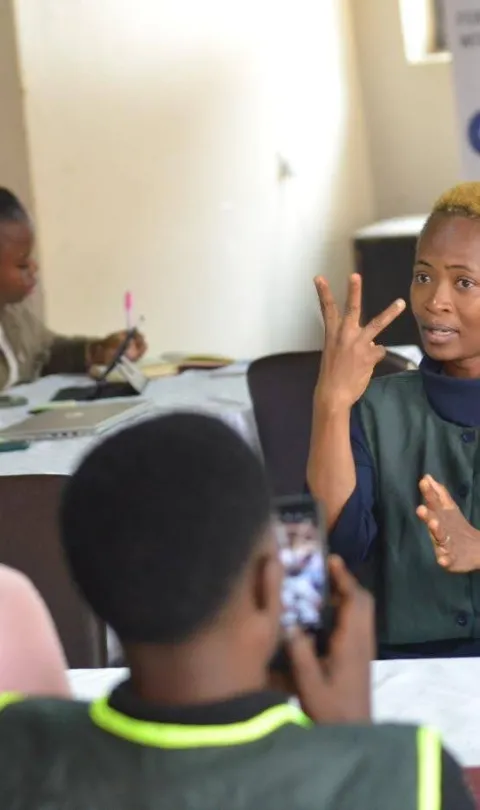My journey from advocate to catalyst
For too long, the voices of people with disabilities have been excluded from data systems that shape policies and programs meant to serve them. This exclusion perpetuates systemic inequalities, making it difficult to track progress and ensure no one is left behind. As a disability-inclusive data activist, my journey with the Data Values Advocates (DVA) program, facilitated by the Global Partnership for Sustainable Development Data (the Global Partnership), has been a transformative experience in bridging this gap.
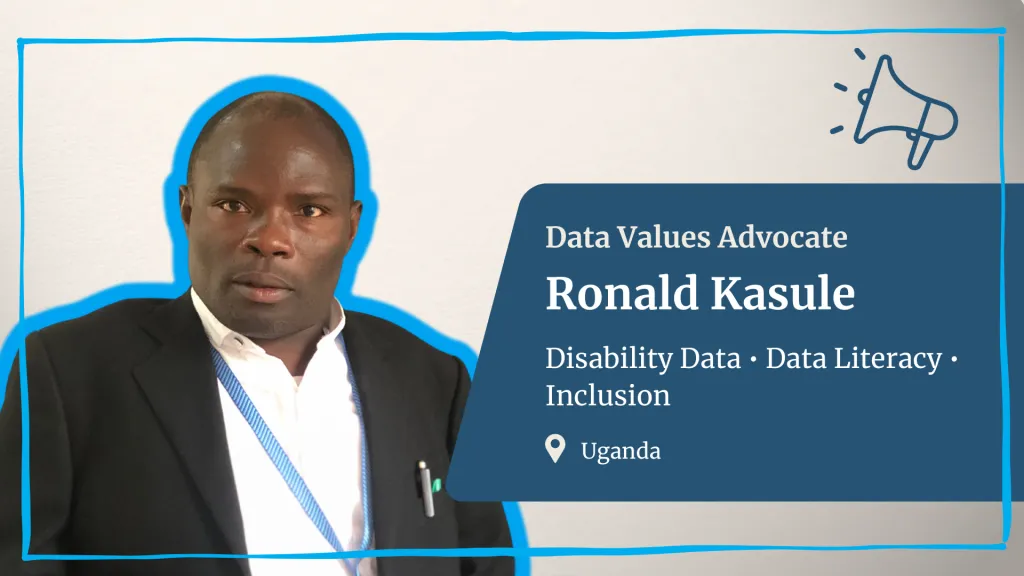
Through the DVA program, I have gained invaluable insights, built collaborations, and implemented impactful initiatives that are shaping the discourse on disability-inclusive data processes in Uganda. This journey has not only strengthened my advocacy but also influenced stakeholders—from organizations of persons with disabilities (OPDs) to civil society organizations (CSOs) and government institutions—to reimagine data as an enabler of inclusion rather than exclusion.
Mobilizing change: Training OPDs and CSOs on inclusive data practices
As part of my role in the DVA program, I led a training initiative that united 15 organizations under a common inclusion agenda; established a permanent structure for the representation of people with disabilities; and empowered participants to advocate for disability inclusion going forward.
The program focused on shifting how disability data is approached in Uganda by equipping OPDs and CSOs in the country with knowledge and skills on disability-inclusive data processes. With financial support from the Global Partnership, this initiative was jointly implemented by Diversity Ability Support Network System (Dasuns) (which I represent) and the National Union of Disabled Persons of Uganda (NUDIPU). The primary goal was to raise awareness, build capacity, and establish a strong foundation for inclusive data advocacy. Through structured training sessions, interactive workshops, and strategic discussions, we empowered key stakeholders to demand better representation of people with disabilities in national data systems.
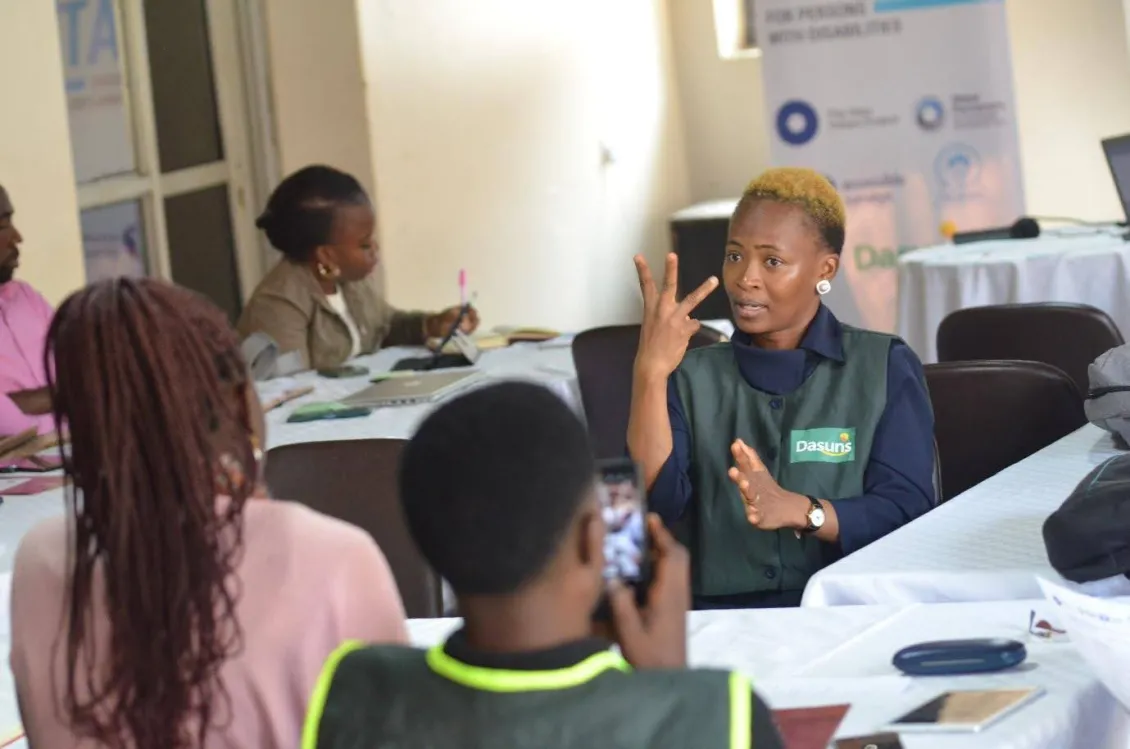
On August 23, 2024, we convened a high-level workshop that brought together more than 30 participants from 15 OPDs and CSOs. Held at Zimbali Bistro and Lounge, the event was a milestone in fostering collective action towards disability data inclusion. The organizations represented included:
- OPDs such as National Union of the Disabled Persons of Uganda (NUDIPU), National Union of Women with Disabilities (NUWODU), National Council for Persons with Disabilities (NCD), Uganda National Association of the Blind (UNAB), Foundation of Persons Affected by Dwarfism (FPAD), Show Abilities Uganda (SAU), Uganda Action on Physical Disability (UNAPD), Uganda Federation of the Hard of Hearing (UFHoH), Albinism Umbrella, the National Association of the Deaf-Blind, among others.
- CSOs such as ZOA Uganda, Light for the World, Teach for Uganda, and Dasuns.
This gathering served as a critical platform for knowledge exchange and strategic action planning.
Key outcomes achieved
The training focused on equipping participants with:
- The principles of the Data Values Manifesto, advocating for equitable and inclusive data representation for people with disabilities.
- The importance of data disaggregation, emphasizing the need for collecting and analyzing disability-specific data.
- Hands-on training on inclusive data tools, including the Accessible Survey Tool—a digital platform promoting barrier-free data collection.
- Strategic engagement with policymakers, particularly the Uganda Bureau of Statistics (UBS), to advocate for the inclusion of people with disabilities in national data systems.
The key outcomes included:
- Uniting 15 organizations under a common inclusion agenda.
- Establishing permanent structure for the representation of people with disabilities.
- Enabling participants to advocate for disability inclusion and directly influence policy conversations in their respective sectors.
- Establishing the Disability Data Forum to advance disability-inclusive data practices in Uganda.
From training to action: Establishing the Disability Data Forum
One of the most significant outcomes of the workshop was the formation of a specialized Data Forum dedicated to advancing disability-inclusive data practices in Uganda. This forum aims to:
- Continue learning and advocacy based on the recommendations from the 2020 Disability Inclusive Data Landscape research conducted by Inclusive Futures with UK Aid funding.
- Engage policymakers, government agencies, and data-driven organizations to push for policy reforms.
- Ensure that disability-related data is mainstreamed across Uganda's development agenda.
This development signifies a shift from passive participation to active influence in national data governance.
From local action to global influence
In addition to implementing inclusive data initiatives in Uganda, a defining milestone in my journey as a Data Values Advocate was moderating a global dialogue at the Fifth United Nations World Data Forum (UNWDF) in Medellín, Colombia. The session, titled “Co-creating Data Action in the Digital Age,” brought together community activists and policymakers from diverse regions to exchange perspectives on advancing fair, inclusive, and accountable data practices. The session featured vibrant voices from across the Global South:
- Maria Paula Hernandez Ruiz (Colombia/Australia): A PhD candidate and anthropologist whose research critiques how gender data is constructed and its implications for social justice.
- Ghislain Irakoze (Rwanda): A social entrepreneur and founder of Wastezon, working to bridge the digital divide by converting e-waste into affordable tech devices.
- Fernande Álvarez Molina (Colombia): A trans lawyer and public health researcher developing digital tools for the safety and health rights of marginalized communities, especially sex workers.
- Aarón Zea (Colombia): Executive Director of Más Que Tres Letras, producing digital content on HIV and supporting young people living with HIV.
- Geoffrey Kariuki (Kenya): A statistician with the Kenya National Bureau of Statistics, focused on refining sampling methodologies and data inclusion strategies.
- Dr. Paula Robledo Silva (Colombia): A seasoned legal expert and current Legal Secretary of the Presidency of Colombia, advocating for inclusive statistical systems that support local autonomy.
Each panelist shared powerful insights into their local initiatives—ranging from LGBTQ+ rights and digital health equity to statistical reform and data activism. The diversity of their experiences underscored common challenges and innovative approaches for making data systems more representative and accountable.
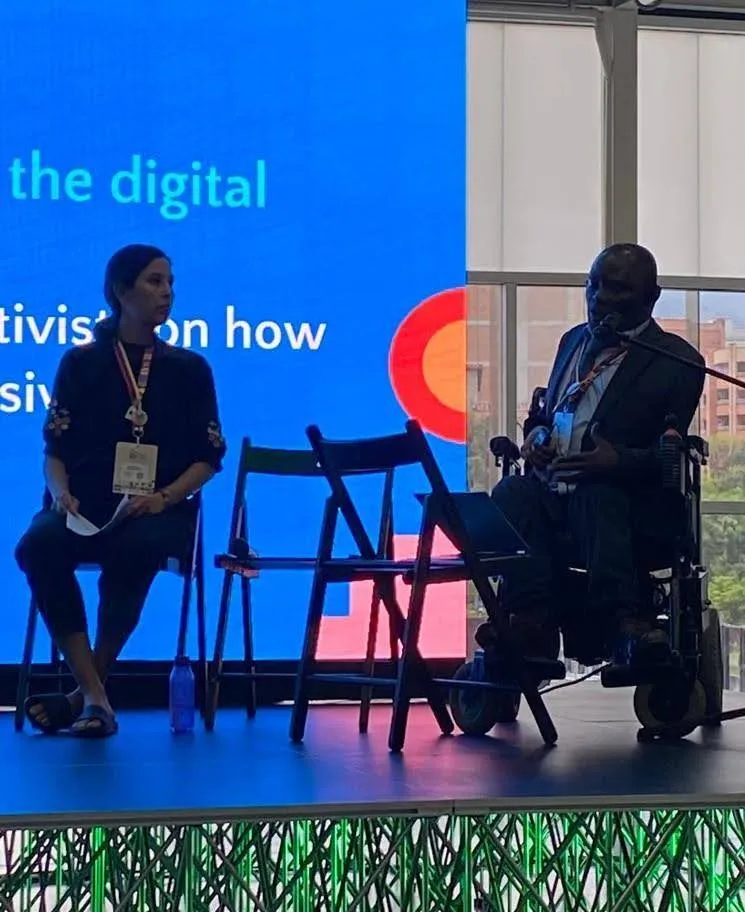
This experience not only amplified Uganda's disability-inclusive data advocacy on the global stage but also reinforced the interconnectedness of inclusive data governance across different contexts.
- Ronald Kasule, Data Values Advocate
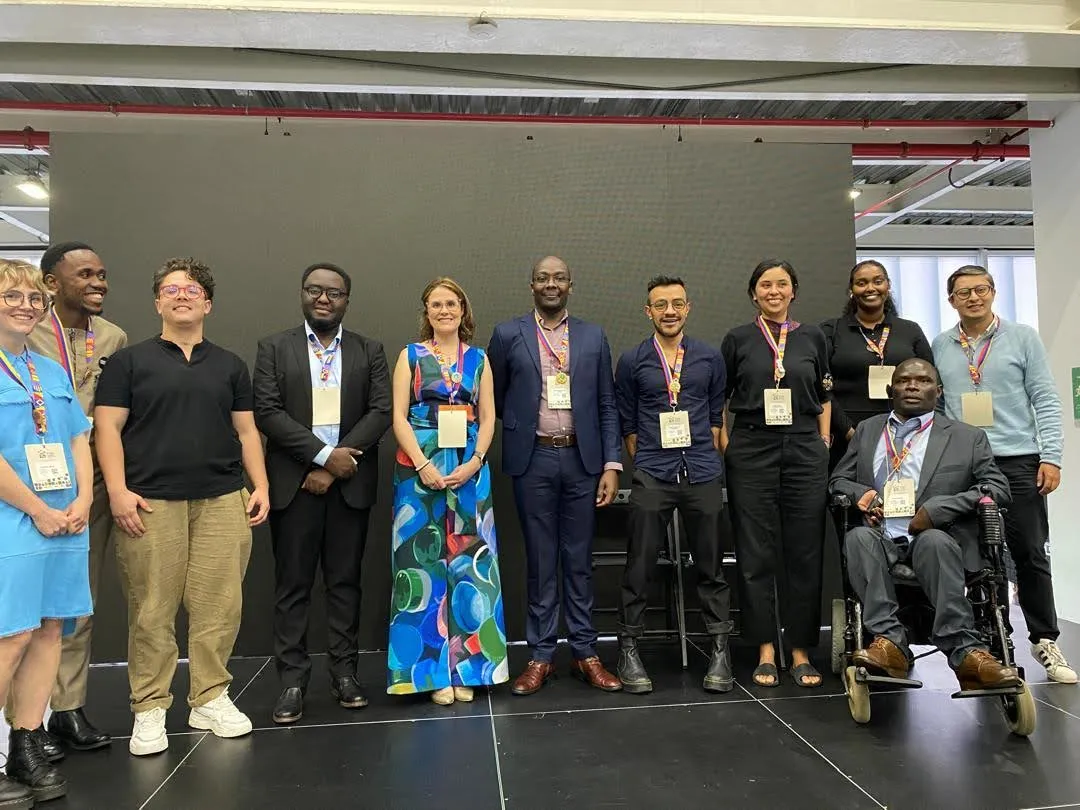
The session yielded several key outcomes that contributed to broader global and local agendas:
- Positioning Uganda’s Disability Data Agenda: Moderating the session enabled me to frame Uganda’s disability data challenges within a global framework, emphasizing the need for inclusive data to inform effective policy-making.
- Amplifying Global South perspectives: The forum elevated voices from Africa, Latin America, and other underrepresented regions, challenging dominant narratives in global data governance and ensuring that context-specific realities are part of global solutions.
- Facilitating South-South knowledge exchange: Through shared stories and collaborative questioning, the dialogue fostered peer learning across contexts—highlighting how local innovations in data activism can inspire adaptable models worldwide.
- Bridging policy and practice: The inclusion of government officials in the Q&A segment enabled practical discussion on policy enablers and barriers, particularly regarding methodological innovation, community agency, and inclusive legal frameworks.
This experience not only showcased Uganda’s efforts but also reaffirmed the universality of data justice struggles—and the power of collaborative action to address them. It reinforced that inclusive data governance is not a technical exercise but a collective human rights imperative.
Raising my profile: Admission to the Africa Data Leadership Initiative (ADLI)
My participation in the DVA program not only strengthened my technical expertise and advocacy skills but also raised my professional profile, leading to my admission into the Africa Data Leadership Initiative (ADLI).
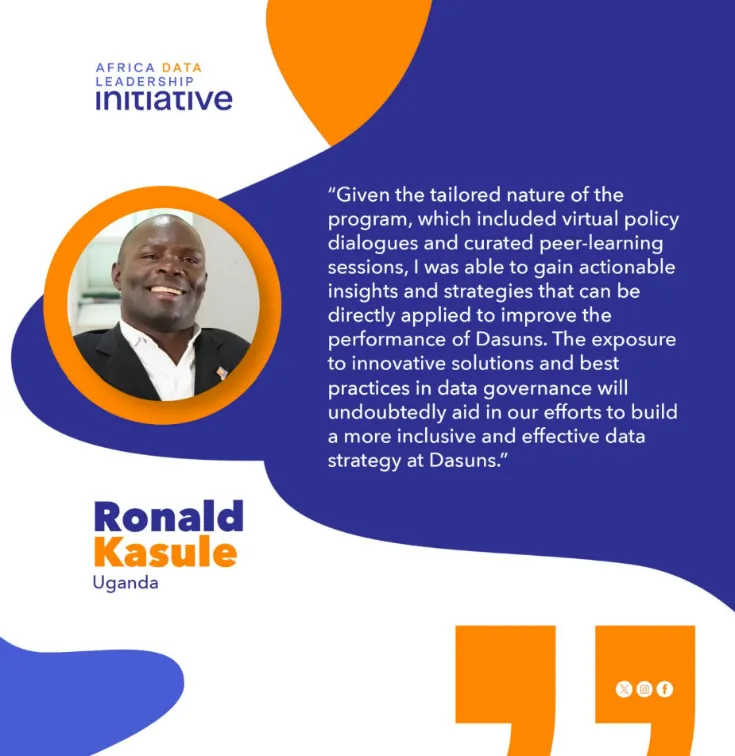
Facilitated by the Digital Impact Alliance (DIAL), Smart Africa, and the UN Economic Commission for Africa (UNECA), ADLI fosters cross-border collaboration on data policy, knowledge exchange, and strategic partnerships. Through my engagement in ADLI, I am furthering my commitment to inclusive data governance, ensuring that disability-inclusive data practices are central to Africa's digital transformation agenda.
ADLI is a peer learning network and policy lab designed to equip African policymakers, researchers, technologists, and civil society leaders with the tools to shape innovative, equitable, and context-sensitive data governance frameworks that promote:
- Strategic approaches to data governance that drive innovation, economic growth, and equitable development.
- Cross-border collaboration on data policy—ensuring that African nations define their own data governance frameworks.
- Capacity building and knowledge exchange—providing tailored mentorship, curated learning sessions, and access to best practices in data governance.
This recognition has expanded my opportunities to contribute to Africa’s digital transformation agenda and advocate for more inclusive and accessible data ecosystems. I am now using the platform as a strategic opportunity to:
- Influence continental and subregional data policy dialogue by mainstreaming disability-inclusive data frameworks into Africa’s digital transformation agenda.
- Reach high-level government and intergovernmental stakeholders—including ministries of ICT, statistics bureaus, and national data offices—who were previously beyond the direct advocacy scope of my work in Uganda.
- Contribute technical input and lived experience to shape pan-African positions on inclusive data governance, especially where disability has historically been excluded or insufficiently addressed.
- Share Uganda’s experience as a model to be replicated across member states, using the Disability Data Forum as a demonstration of local innovation.
- Mentor and collaborate with peers across Africa, catalyzing a shared commitment to embedding disability indicators in national data strategies, household surveys, and SDG monitoring frameworks.
- Promote inclusive data financing to support the scale-up of assistive technologies and accessible data systems for persons with disabilities.
For instance, in the coming few months, I intend to:
- Champion the integration of disability indicators in the Smart Africa blueprint and Digital Economy Moonshot frameworks.
- Advocate for cross-country learning and policy harmonization based on Uganda’s inclusive data practices.
- Strengthen the agency of OPDs to shape the narrative on disability statistics.
- Ensure that disability-inclusive data principles are embedded in Uganda’s national governance frameworks and that global conversations continue to spotlight disability inclusion in data systems.
ADLI is helping me to position Uganda’s experience within broader continental frameworks while ensuring that disability inclusion is not sidelined but seen as central to Africa’s digital future.
Impact and the road ahead
Through the DVA program, my role as a disability-inclusive data activist has evolved beyond advocacy into action-driven, systemic change. The impact of my participation is already visible in several areas:
- Increased awareness: More OPDs and CSOs are now actively participating in conversations around data equity and representation.
- Policy influence: Engagements with the Uganda Bureau of Statistics (UBS) have opened new pathways for integrating disability data into national planning mechanisms.
- Sustainability efforts: The establishment of the Disability Data Forum has created a lasting platform for continued engagement, learning, and advocacy.
- Regional expansion: Participation in global forums such as the UNWDF and ADLI has enabled me to scale these efforts regionally and internationally.
However, this journey was not without challenges—many of which offer critical lessons for future programming:
- Technical complexity: Some OPDs found the concepts and tools overwhelming. In response, we adapted our sessions with real-time simplification, and we recommend future programming include learner segmentation, cascading content, localized context, and multimedia resources.
- Engagement fatigue: The depth of content led to participant fatigue. This has informed a shift toward more distributed learning schedules, incorporating peer support mechanisms and energizing formats.
- Time constraints: Critical themes, such as data disaggregation, needed more attention than available. To address this, follow-up mentorship and resource sharing were prioritized, and we propose modular learning tracks for the Disability Data Forum moving forward.
These insights emphasize that sustained capacity building, adaptive learning approaches, and continuous engagement are essential to making inclusive data governance truly transformational.
As I transition into the DVA Alumni Network and expand my participation in ADLI, I remain committed to ensuring disability-inclusive data is central to both national and continental data ecosystems. The road ahead involves not only sustaining this momentum but also ensuring others—especially underrepresented groups—are empowered to co-lead this journey toward data justice and equity.
